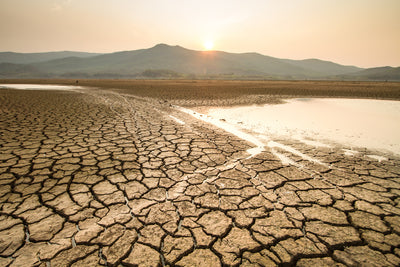Why Does My Tap Water Taste Like Dirt?
RSS
Christina Liu | Hydroviv Science Team
Recent reports of Sacramento’s drinking water raises into question what's causing "earthy-tasting" tap water. This phenomenon is caused mostly by two chemicals: geosmin and 2-methylisoborneol (2-MIB), which are produced by certain bacteria and blue-green algae. While these are not toxic or harmful when consumed, both produce a distinctive smell and taste similar to freshly unearthed soil, which can be unpleasant when drinking water.
Where Does The Smell and Taste of Dirt Come From?
Surface water sources such as lakes, rivers, and reservoirs have naturally-occurring bacteria and algae (including blue-green algae or Cyanobacteria) that produce geosmin and 2-methylisoborneol (2-MIB). When water levels are low (often in late summer or early fall, during times of drought), or during an algae bloom, the geosmin and 2-MIB concentrations are higher in the source water so the taste and odor of “dirt” becomes much more noticeable in the drinking water.
Should I Be Worried About Geosmin In My Water?
Other than having a smell and taste that resembles dirt, geosmin and 2-MIB are not harmful chemicals. In fact, geosmin is also what gives beets their distinctive earthy taste, contributes to a musty, unpleasant off-flavor in wines with tainted corks, and a “muddy” flavor that sometimes occurs in catfish and crawfish. Fortunately, other than being an annoyance to the taste buds, geosmin is neither toxic nor harmful at the levels present in drinking water.
What Can I Do About It?
According to municipal water treatment facilities, geosmin and MIB cannot be removed from water using standard treatment processes. Treating for geosmin and 2-MIB requires additional treatment, which may not be available to all municipal water suppliers. Activated carbon filters may be able to help somewhat but few studies have been completed to address this issue.
Municipal water companies suggest refrigerating the water first, as the taste is less pronounced when the water is cold, or adding lemon to help mask the flavor.
Diminishing water sources means that drinking dirt-tasting water will likely become a more frequent occurrence, especially in areas prone to drought. This becomes exacerbated as climate change continues to raise global temperatures. It's important to do our part to preserve freshwater resources in years to come, and conserve as much tap water as possible. An important way to do this is by following the guidance of your municipal water supplier for conserving water.
How Can Hydroviv Help Me?
Hydroviv is a water filtration company that uses water quality data to optimize water filters for each customer's water. For water systems that are near industrial and agricultural waste ponds, we include specialized filtration media to remove the contaminants of concern, which may include lead, arsenic, radium, and uranium. In addition, all of our filters include broad protection against a wide range of contaminants.
If you’re interested in learning more about water filters that have been optimized for your location, or have questions about water quality in general, feel free to visit www.hydroviv.com, reach out by email (hello@hydroviv.com) or through our live chat on our website Hydroviv.com. Also check out our water-related news on Twitter, Instagram, and Facebook.
Hydroviv's drinking water filters carry NSF certifications to Standard 42 (aesthetic effects--Chlorine Removal) and Standard 53 (health effects--Lead, VOCs, and PFOA/PFOS removal), and are independently tested to remove hundreds of contaminants.
Other Articles We Think You’ll Enjoy:
How Do Droughts Affect Your Drinking Water?
Water Infrastructure and Cybersecurity
Why Does My Drinking Water Taste Bad?


